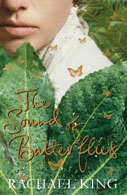 | Rachael King THE SOUND OF BUTTERFLIES Picador, 368 pp. Source: review copy Review by Michael Freeman |
It seems strange, given this novel's title, but an overwhelming sense of dread pervades The Sound of Butterflies. Although butterflies are probably the least scary thing imaginable, Rachael King's debut novel instils the reader with a sense of unease I have not encountered since I read Dracula as a 12-year-old. Not because The Sound of Butterflies is really about vampires (it isn't), and not because it deals with supernatural encounters (it doesn't). The Sound of Butterflies is unsettling because it explores the territory trodden by Bram Stoker in 1897, and countless others since, turning the routine into the terrifying.
When we first join the story, it is 1904, Victorian England. The novel's protagonist, butterfly collector Thomas Edgar, is returning from Brazil where he was hunting butterflies, something he has done avidly since childhood. Specifically, Thomas was hunting a particular type of butterfly which few had apparently seen and might not even exist. Thomas hoped to find, capture and catalogue the exotic insect, and name it after his loving wife Sophie, who is faithfully awaiting her husband's return at Liverpool station. But when Thomas and Sophie are reunited, all it not as it was -- Thomas has returned afflicted by near-catatonia, and is seemingly unable (or unwilling) to speak.
From this point, the narrative flits back and forth in time from England to Brazil, and we get to meet a Thomas who is not in a fugue-like state. We see Thomas (along with three other robust British naturalists) embark on an expedition to the Amazon that is funded by a mysterious benefactor known as Jose Santos, who apparently made his money from rubber plantations. Little is otherwise known of the mysterious Mr Santos, and it is assumed that he is simply benevolent, In the beginning, few questions are asked of his motives. This may strike the reader as a little naïve, although no doubt Jonathan Harker made the same initial assumption about Dracula.
It is said that in all of literature, there is only one plot -- that of the journey from innocence to experience. While such a suggestion may be a little simplistic, it more than adequately describes the plot of The Sound of Butterflies. Rachael King's descriptions of the lushness and beauty of South America, with its casual dangerousness for the unwary traveller, are rich and compelling. What was initially exciting and thrilling for Thomas and his colleagues soon becomes unnerving and ominous, and finally deadly.
There is an interesting contrast going on here with the prim and proper Victorian England which Sophie inhabits. Sophie's world is mundane, even boring -- although her friend Agatha seems remarkably insouciant for Victorian times. Sophie pines for her husband, even when he is sleeping right next to her, and is always cogniscent of appearances -- well aware of how people will react should Thomas' condition become public, Sophie strives to keep it secret as long as possible. That she should so strive should not surprise, although it seems a little unrealistic that she should succeed for as long as she does.
While the ending might seem a little trite, this tale of brutality in the Amazonian rainforest rarely disappoints. Ms King has clearly inherited the story-telling genes of her father, one of New Zealand's more successful novelists, and applies them with great effect here. Ms King continually and effortlessly manages to shock the reader, and it is to her credit that she manages to do so with a story about butterflies.
